Unit 5 Do you have a soccer ball人教版七年级教学设计
Unit 5 Do you have a soccer ball?人教版英语七年级上册有答案
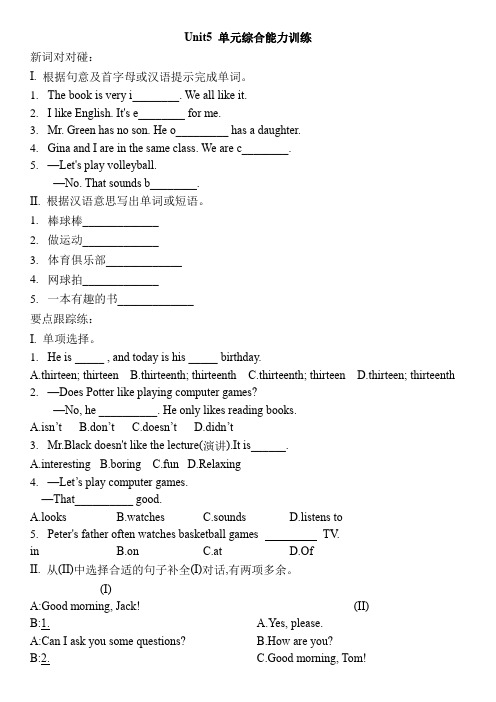
Unit5 单元综合能力训练新词对对碰:I. 根据句意及首字母或汉语提示完成单词。
1.The book is very i________. We all like it.2.I like English. It's e________ for me.3.Mr. Green has no son. He o_________ has a daughter.4.Gina and I are in the same class. We are c________.5.—Let's play volleyball.—No. That sounds b________.II. 根据汉语意思写出单词或短语。
1.棒球棒_____________2.做运动_____________3.体育俱乐部_____________4.网球拍_____________5.一本有趣的书_____________要点跟踪练:I. 单项选择。
1.He is _____ , and today is his _____ birthday.A.thirteen; thirteenB.thirteenth; thirteenthC.thirteenth; thirteenD.thirteen; thirteenth2.—Does Potter like playing computer games?—No, he __________. He only likes reading books.A.isn’tB.don’tC.doesn’tD.didn’t3.Mr.Black doesn't like the lecture(演讲).It is______.A.interestingB.boringC.funD.Relaxing4.—Let’s play computer games.—That__________ good.A.looksB.watchesC.soundsD.listens to5.Peter's father often watches basketball games TV.in B.on C.at D.OfII. 从(II)中选择合适的句子补全(I)对话,有两项多余。
人教版英语七上 U5 Do you have a soccer ball 讲义

Unit5 Do you have a soccer ball?一、重点词汇及拓展1. have v.(1) 有e.g. I have a pen. 我有一只钢笔。
(2) 吃;喝e.g. I have breakfast every day. 我每天吃早饭。
(3) 经历e.g. have a good time 玩得开心;过得愉快(4) 上课e.g. We have English lessons every day. 我们每天上英语课。
(5) 举办e.g. Mark has a party. 马克举办了一个派对。
(6) 得…病e.g. He has a cold and a headache. 他感冒和头疼。
2. let v.允许;让let’s = let us 让我们let sb. do sth. 让某人做某事let sb. not do sth. 让某人不要做某事e.g. Let’s have a party tonight! 让我们今晚举办一个派对吧!make sb. do sth. 使某人做某事e.g. The movie makes me miss my mother. 这部电影使我怀念我的妈妈。
3. go v.去;走go to +地点去某地go to school 去学校go here/there/home 去这儿/去那/回家go shopping 去购物go swimming 去游泳go hiking 去远足go skating 去轮滑go boating 去划船4. lateadj. 迟的;晚的be late for school 上学迟到be late for class 上课迟到1be late for work 上班迟到adv. 迟地;晚地later adv. 后来;以后e.g. Three days later, he found his father. (句中有段时间+later,句子用一般过去时)三天后,他找到了他的爸爸。
Unit5 DoyouhaveasoccerballSectionA课件人教版七年级英语上册

Let’s ask the teacher for English books. 5.请去给我拿一个杯子来。 Please get a cup for me.
I can’t be late . 4.get,let,ball,me,the
Let me get the ball . 5.see,basketball,you,the,can
Can you see the basketball ?
七、 完形填空。 Hello!I’m 1 .I’m an English boy.I 2 two sisters. 3 are Sonia and
Unit 5 Do you have a soccer ball
第1课时 Section A 1a~1c
一、 看图片写球类单词。
1. basketball
2. baseball
3. volleyball
4. ping-pong
5. tennis
二、 用所给词的适当形式填空。 1.Do you have (have) a ball? 2. Does (do) your cousin have a volleyball? 3.The boy has (have) two pencil boxes. 4.The hats (hat) are Jack’s. 5.We have two soccer balls (ball).
( C )1.How many volleyballs does Barry have?
Unit 5 Do you have a soccer ball 知识点归纳-七年级上册英语

人教版新目标七上英语单元知识点归纳Unit 5 Do you have a soccer ball?重点词汇tennis/'tenis/ n. 网球bat /bæt/ n. 球棒;球拍soccer ball (英式)足球volleyball/'vɔlibɔ:l/ n. 排球basketball/'ba:skitbɔ:l/ n. 篮球late/leit/ adj. 迟到great/greit/ adj. 美妙的;伟大的play/plei/ v. 参加(比赛或运动);玩耍sound/saund/ v. 听起来好像interesting/'intrəstiŋ/ adj. 有趣的boring/'bɔ:riŋ/ adj. 没趣的;令人厌倦的fun/fʌn/ adj. 有趣的;使人快乐的n.乐趣;快乐difficult/'difikəlt/ adj. 困难的relaxing/ri'læksiŋ/ adj. 轻松的;令人放松的watch/wɔtʃ/ v. 注视;观看same/seim/ adj. 相同的easy/'i:zi/ adj. 容易的;不费力的class/kla:s/ n. 班级;课classmate/'kla:smeit/ n. 同班同学重点短语:a tennis bat 一个网球拍play basketball 打篮球baseball bat 棒球棒have a soccer ball 有一个足球play soccer 踢足球with our friends 和我们的朋友一起have a ping-pong ball 有一个乒乓球play ping-pong 打乒乓球have a volleyball 有一个排球play volleyball 打排球at school 在校,上学play sports 做运动watch TV 看电视in my bag 在我的包里be late 迟到on TV 电视上必背典句:1. Do you have a soccer ball? 你有一个足球吗?2. Does he/she have a ping-pong ball?他/她有一个乒乓球吗?3. Do you play sports with your classmates? 你和你的同学一起做运动吗?4. Let’s play soccer together! 我们一起踢足球吧!5. How many sports do you like?你喜欢多少种运动?6. I like playing soccer and basketball. 我喜欢踢足球和打篮球。
人教版新课标英语七年级上册《Unit 5 Do you have a soccer ball Sec
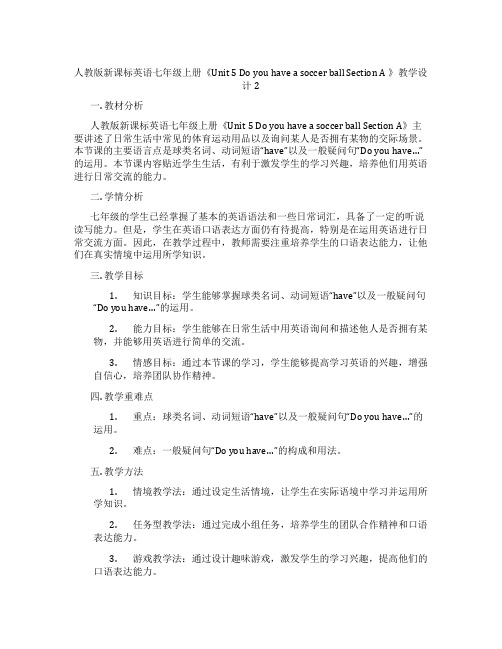
人教版新课标英语七年级上册《Unit 5 Do you have a soccer ball Section A 》教学设计2一. 教材分析人教版新课标英语七年级上册《Unit 5 Do you have a soccer ball Section A》主要讲述了日常生活中常见的体育运动用品以及询问某人是否拥有某物的交际场景。
本节课的主要语言点是球类名词、动词短语“have”以及一般疑问句“Do you have…”的运用。
本节课内容贴近学生生活,有利于激发学生的学习兴趣,培养他们用英语进行日常交流的能力。
二. 学情分析七年级的学生已经掌握了基本的英语语法和一些日常词汇,具备了一定的听说读写能力。
但是,学生在英语口语表达方面仍有待提高,特别是在运用英语进行日常交流方面。
因此,在教学过程中,教师需要注重培养学生的口语表达能力,让他们在真实情境中运用所学知识。
三. 教学目标1.知识目标:学生能够掌握球类名词、动词短语“have”以及一般疑问句“Do you have…”的运用。
2.能力目标:学生能够在日常生活中用英语询问和描述他人是否拥有某物,并能够用英语进行简单的交流。
3.情感目标:通过本节课的学习,学生能够提高学习英语的兴趣,增强自信心,培养团队协作精神。
四. 教学重难点1.重点:球类名词、动词短语“have”以及一般疑问句“Do you have…”的运用。
2.难点:一般疑问句“Do you have…”的构成和用法。
五. 教学方法1.情境教学法:通过设定生活情境,让学生在实际语境中学习并运用所学知识。
2.任务型教学法:通过完成小组任务,培养学生的团队合作精神和口语表达能力。
3.游戏教学法:通过设计趣味游戏,激发学生的学习兴趣,提高他们的口语表达能力。
六. 教学准备1.教师准备:提前准备好教学课件、球类图片、实物球类等教学资源。
2.学生准备:预习本节课内容,了解球类名词和动词短语“have”的用法。
人教版七年级上册英语Unit5Doyouhaveasoccerball
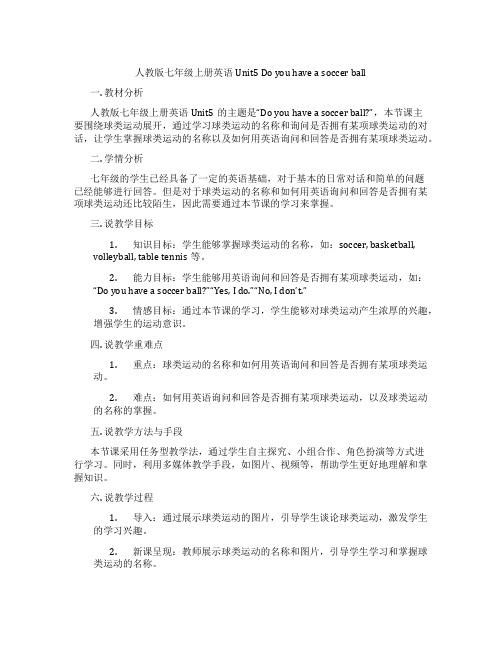
人教版七年级上册英语Unit5 Do you have a soccer ball一. 教材分析人教版七年级上册英语Unit5的主题是“Do you have a soccer ball?”,本节课主要围绕球类运动展开,通过学习球类运动的名称和询问是否拥有某项球类运动的对话,让学生掌握球类运动的名称以及如何用英语询问和回答是否拥有某项球类运动。
二. 学情分析七年级的学生已经具备了一定的英语基础,对于基本的日常对话和简单的问题已经能够进行回答。
但是对于球类运动的名称和如何用英语询问和回答是否拥有某项球类运动还比较陌生,因此需要通过本节课的学习来掌握。
三. 说教学目标1.知识目标:学生能够掌握球类运动的名称,如:soccer, basketball,volleyball, table tennis等。
2.能力目标:学生能够用英语询问和回答是否拥有某项球类运动,如:“Do you have a soccer ball?”“Yes, I do.”“No, I don’t.”3.情感目标:通过本节课的学习,学生能够对球类运动产生浓厚的兴趣,增强学生的运动意识。
四. 说教学重难点1.重点:球类运动的名称和如何用英语询问和回答是否拥有某项球类运动。
2.难点:如何用英语询问和回答是否拥有某项球类运动,以及球类运动的名称的掌握。
五. 说教学方法与手段本节课采用任务型教学法,通过学生自主探究、小组合作、角色扮演等方式进行学习。
同时,利用多媒体教学手段,如图片、视频等,帮助学生更好地理解和掌握知识。
六. 说教学过程1.导入:通过展示球类运动的图片,引导学生谈论球类运动,激发学生的学习兴趣。
2.新课呈现:教师展示球类运动的名称和图片,引导学生学习和掌握球类运动的名称。
3.对话练习:学生两人一组,模拟对话场景,练习如何用英语询问和回答是否拥有某项球类运动。
4.小组活动:学生分成小组,进行角色扮演,模拟真实场景,运用所学知识进行对话。
人教版新教材七年级英语上unit5_do_you_have_a_soccer_ball_SectionB
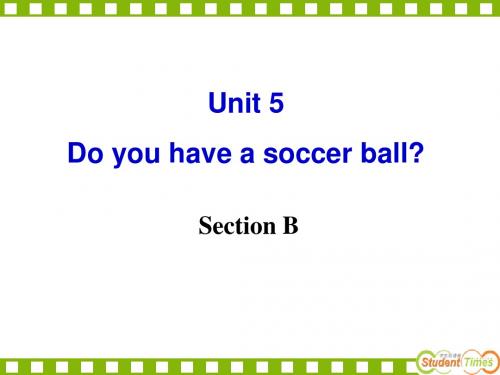
Haha! It’s difficult.
boring 无聊的,令人生厌的
Hmm. It’s boring.
1. interesting 有趣的, 令人感兴趣的
2. fun
有趣的, 令人愉快的
3. relaxing
4. difficult
5. boring
轻松的
困难的
无聊的, 令人生厌的
What do the pictures mean?
Let play baseball.
A: Let’s play basketball. B: I
don’have t a basketball.
A: Well, let’s play ping-pong.
B: That play volleyball.
B: I don’t have a volleyball.
A: Well, let’s play soccer. B: That sounds good/interesting/fun…
A: Let’s … B: That sounds good/interesting/difficult/
boring/fun/relaxing/....
computer
___you _____ Do have a computer? Yes, I_______. do I ______ have a computer
√
___ he have _____ Does a ruler? No, he doesn ______. ’t ’t have a Hedoesn __________ ruler.
有趣的
2a Find the sports words in the unit. Write them in the correct column.
人教版七年级英语上册第五单元unit5doyouhaveasoccerball全英教案

人教版七年级英语上册第五单元Unit 5 Do you have a soccer ball全英文教案Period One(1a-2d)Teachingaims 1) Enable students to use “have”and “has”to talk about ownership. 2) Learn the general questions begin with “do,does”and understand the personal forms and numeros.Key points1) Read and write new letters . 2) The general questions beginwith “do,does.”Difficult points 1) Learn “does” general questions and its answers.2) The usage of “has”.Languagepoints Tennis ball,ping-pong bat,soccer ball,volleyball,basketball,baseball bat.---Do you have a baseball? Yes, I do./No, I don’t.---Does she/he have a tennis ball? Yes,she does./No,she doesn’t. Ability Learn to talk about the ownership.Teaching procedures:Step 1 Warming-up1. Greetings.2. Review the letters and language structures the Ss have learnedin Unit Four.Step 2 Presentation1. Show the students other objects. Teach the new words “soccerin theball, ping-pong ball, volleyball, tennis bat, ping-pong bat” same way. --- What’s this/ tha t?---It’s …2. Look at the words in 1a and match the words with the things inthe picture.3. Present the key structure.Present these questions and answers.(Point to a student who has a pencil box.)T: Do you have a pencil box?S1: Yes, I do. (Nod your head yes) / No, I don’t. (Shake your headno)T: (Ask S2) Does she have a pencil box?S2: (Help S2 answer) Yes, she does. / No, she doesn't.Step 3 PracticeGet Ss to finish 1a.1b,1c,2a,2b,2c.Step 4 Presentation(Show a soccer ball to class.)T: Let’s play soccer ball after class, OK?S1: OK.T: We often use the drill “Let’s…”to make a suggestion. If youwant to do it, you may say “OK. / That sounds good. / All right …”If you don’t want to do it, you may say “No, I don’t have a …”Step 5 Role-play1. Cindy and Helen want to play baseball. Now read the conversation and match the things with their right places.2. Read the conversation after the teacher and practice the conversation with your partner.3. Ask some pairs to act out the dialogue in front of the class.Homework1. Recite the new words and conversations we have learned.2. Finish Exercise 1.BriefsummaryUnit5 Do you have a soccer ball?Period Two(3a-3c)Teachingaims 1) Get Ss to use have and has to talk about ownership freely. 2) Further learn the general questions begin with “do,does”andunderstand the personal forms and numeros.Key points1) The general questions begin with “do,does.” 2)The usage ofpersonal forms and numeros.Difficult points 1) How to enable students to understand ang grasp the usage of personal forms and numeros.Languagepoints Great, play, That sounds good.---Does Bob have a soccer ball? Yes,he does./No,he doesn’t.Ability understand and grasp the usage of personal forms and numeros skilfully.Teaching procedure:Step 1 Warming-up1.Greeting the Ss. Check their homework. (Let some Ss reporttheir parents' sports collection)2. Let the Ss work in groups (each group has three Ss). Reviewthe sentence structures we learned.Step 2. Grammar Focus.Get Ss to read the sentences in the chart and drawa conclusion about how to use “do” and “does.”Step 3 Practice1. 3a. Write each word in the correct place in the chart.2. 3b. Ss complete the conversations with their partner.3. Check the answers with the class. (Let some pairs readthe conversation).4. Ss practice the conversation with their partner then act outthe dialogue.Step 4 Game (Remembering game)T: Look! This is Bob's room. He has many things. Look at thethings in his room for three minutes. Then close your booksand ask and answer questions with your partner.Step 5 Homework1. Recite the new words and conversations we have learned.2. Finish Exercise 2.BriefsummaryUnit5 Do you have a soccer ball?Period Three(Section B 1a-2c )Teachingaims 1)Get Ss to grasp the new words andphrases:interesting,fun,relaxing,boring,difficult.2)Get Ss to understand the survey results:Who has a soccer ball?Key points1) Talk about Ss’ likes and dislikes with description words.2)GetSs to find the answer to the questions after they read the essay.Difficult points How to enable students to understand and grasp the new words and phrases.Languagepoints Interesting, difficult, easy,relaxing,boring,fun,love sports,after class,watch TV.---Let’s play……----That sounds…..Ability Develop Ss’ primary reading abilities.Enable them to find the answer to the questions.Teaching procedure:Step 1 Warming-up1. Greet the Ss. Check the homework. (Let some pairs read out their conversation. Correct the mistakes they make)2. Review the chart of pronouns. (Show the chart on the screen)3. Let Ss look at the picture in 3a. Ask some pairs ask and answer about the picture.Step 2. Presentation1. (Show the picture which a boy is doing an interesting thing on the screen.) Learn the new words, interesting2.(Show other pictures on the screen) learn the new words: boring, fun, difficult, relaxing, easy, in the same way3. (Show some activity pictures on the screen) Learn the new phrases: "watch TV", "go to the same school", "love soccer", "after class" and "play sports"4. (Show some pictures of students on the screen)Learn the new words "student", "classmate"5. Let Ss read the new words and phrases and try to remember them.6. Read the words in 1a. (Point to the five words in 1a and ask students to repeat each one.)Correct the answers.Step 3 Listening1. Next we’ll listen to a conversation. Here are two boys in the conversation. What do they want to do? Listen.(Play the recording the first time.) (For the first time, students only listen.)2. Listen again and check the words you hear in 1a. (Play the recording again.), after that, get Ss to finish 1c.3. Check the answers.Step 4 Pair work1. T: Act out the conversation in 1c in pairs. You are Paul. Your partner is Paul's friend, Jenny. Talk about the activities in 1c.2. Let some pairs act out the conversation in front of the class. Step 5 Presentation1. (T holds basketball and another student holds a soccer ball)T: I have a basketball, but I don't have a soccer ball.He has a soccer ball, but he doesn't have a basketball.2. Write the sentence structure on the blackboard.形为动词have的否定句的构成:①第一人称/第二人称/第三人称复数人称+ don't + have + 某物②第三人称单数形式+ doesn't + have + 某物e.g.I don't have a watch.She doesn't have a tennis ball.Step6 Writing1. Find the sports words in the unit. Write them in the correct column.2. Make a report to your partner first.S1: I have a soccer ball, a volleyball, two tennis balls, three ping-pong bat…I don't have a basketball, a tennis bat, a baseball bat…3. Exchange the chart with your partner. Report your partner's sports collection.S2: He has a soccer ball, a volleyball, two tennis balls, three ping-pong bats…He doesn't have a basketball, a tennis bat, a baseball bat…Step7 Reading1. Our school magazine made a survey about sports collection. This is the survey result. Read the passage a nd answer the question:Who has a soccer ball?2. Ss read the passage q uickly and find the answer to thequestion.3. Check the answer. Let some students say their answer andsay why?4. Now let's work on 2c.Who do you think says these sentences? C heck (√) F forFrank, G for Gina or W for Wang Wei.Homework1. Review the new words we learn in this part.2. Finish Exercise3.BriefsummaryUnit5 Do you have a soccer ball?Period Four(Section B 3a-self check )Teachingaims 1)Go on learning the general questions beginning with Do or Does and the answers.2)Go on learning don’t or doesn’t in the negative sentences,understand the usage of but.Key points1)Consolidate the usage of have in the negative and generalquestions.2)Develop Ss’ abilities of writing.Difficult points Guide Ss to write with have in the negative and general questions.Languagepoints Does your mom have a baseball bat? Tom has a baseball, but he doesn’t have a baseball bat.Ability Get Ss to use have or has to write a short passage in the real situation. Teaching procedure:Step 1 Warming-up1. Greet the Ss. Check the homework. (show the chart on thescreen.)2. Review the sports words in the unit. Then let some Ss reportthe sports things they have and the things they don't have.Step 2. Writing1. Let's work on 3a. This is a survey chart. You have to writesome more questions about sports equipment in the chart. Usingthe sentence structure "Do you have a…?".2. Ss write three or more questions about sports equipment.Step 3 SurveyNow exchange books with your partner. Answer his or herquestions in 3a.You can only check (√) of the answers.Step 4 Writing1. Look at the information in 3a. Write about yourself and yourpartner with but.Ss read the first two sentences a nd try to write their own sentences according to 3a.2. 指导:①but是一个转折连词,表示意思上的转折,常用来连接两个句子。
七年级英语上册《Unit 5 Do you have a soccer ball》知识点 (新版)人教版

Unit 5 Do you have a soccer ball?1. Do you have......? Yes, I do. No, I don’t..你有……吗?是的,我有。
不,我没有。
Do they have......? Yes, they do. No, they don’t..Does he have......? Yes, he does. No, he doesn’t.Does she have......? Yes, she does. No, she doesn’t.在一般现在时中,句子的谓语动词若是实义动词,常借助助动词do或does来构成否定句或疑问句。
Does用于主语是第三人称单数的句子中,其他情况用do。
2. do/does1)作助动词,帮助构成一般现在时的否定句或疑问句,无意义。
Do you have a soccer ball? 你有足球吗?I don’t know. 我不知道。
Does Jim have a sister? 吉姆有妹妹吗?What does he like? 他喜欢什么?He doesn’t like English. 他不喜欢英语。
2) 作实义动词,“做,干”。
I do my homework every day. 我每天都做家庭作业。
Bob does his homework every day. 鲍勃每天都做家庭作业。
3) 在一般现在时中,do/does 可用来替代上文出现过的动词,以避免重复。
Do you have a soccer ball? 你有足球吗?Yes, I do. 是的,我有。
(do 代have)Does she have an eraser? Yes, she does.I don’t have a soccer ball, but my brother Alan d oes.我没有足球,但我的哥哥艾伦有。
3.Let’s do sth. “(让)我们做某事吧。
七年级英语上册 Unit 5 Do you have a soccer ball单元主题写作五 (新版)人教新目标版
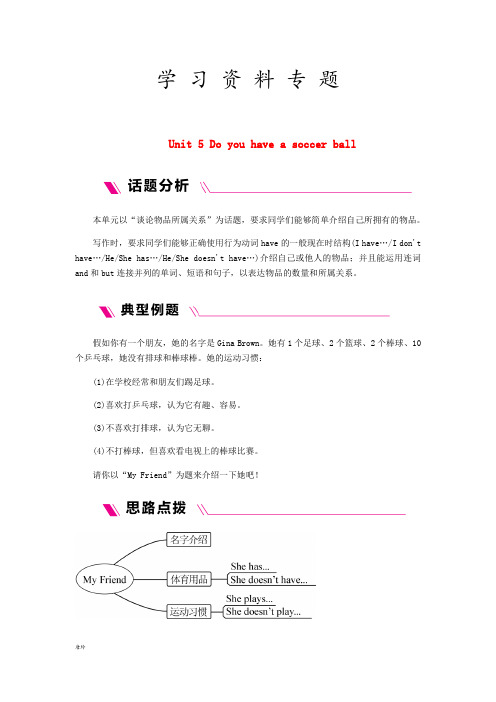
学习资料专题Unit 5 Do you have a soccer ball本单元以“谈论物品所属关系”为话题,要求同学们能够简单介绍自己所拥有的物品。
写作时,要求同学们能够正确使用行为动词have的一般现在时结构(I have…/I don't have…/He/She has…/He/She doesn't have…)介绍自己或他人的物品;并且能运用连词and和but连接并列的单词、短语和句子,以表达物品的数量和所属关系。
假如你有一个朋友,她的名字是Gina Brown。
她有1个足球、2个篮球、2个棒球、10个乒乓球,她没有排球和棒球棒。
她的运动习惯:(1)在学校经常和朋友们踢足球。
(2)喜欢打乒乓球,认为它有趣、容易。
(3)不喜欢打排球,认为它无聊。
(4)不打棒球,但喜欢看电视上的棒球比赛。
请你以“My Friend”为题来介绍一下她吧!单词1.网球________2.排球________3.篮球________4.困难的________5.同班同学________6.爱;喜爱________7.有趣的________8.轻松的;令人放松的________短语1.打篮球________________2.玩电脑游戏________________3.打排球________________4.打乒乓球________________5.进行体育运动________________6.课后________________7.看电视________________8.去同一所学校上学________________句型1.Tom likes sports and he has six pingpong bal ls.汤姆喜欢运动,他有六个乒乓球。
2.Her brother has a baseball, but he doesn't have a soccer ball. 她哥哥有一个棒球,但是他没有足球。
人教版七年级上册英语讲义 Unit 5 Do you have a soccer ball

Unit5 Do you have a soccer ball?讲义一、【重点单词】do /du:/助动词,帮助构成一般现在时的否定句或疑问句,无意义;实义动词“做,干”have /hæv/有tennis /'tenɪs/网球ball /bɔ:l/球ping-pong乒乓球bat /bæt/球棒;球拍soccer /'sɑ:kər/,/'sɒkə/(英式)足球soccer ball(英式)足球volleyball /'vɒlɪbɔ:l/排球basketball /'bɑ:skɪtbɔ:l/篮球let /let/允许;让us /ʌs/ (we的宾格)我们let's = let us让我们(一起)go /ɡəʊ/去;走we /wi:/我们late /leɪt/迟到has /hæz/有(have的第三人称单数形式)get /ɡet/去取(或带来);得到great /ɡreɪt/美妙的;伟大的play /pleɪ/参加(比赛或运动);玩耍sound /saʊnd/听起来好像interesting /'ɪntrəstɪŋ/有趣的;使人快乐的;乐趣;快乐difficult /'dɪfɪkəlt/困难的relaxing /rɪ'læksɪŋ/轻松的;令人放松的watch /wɒʧ/注视;观看TV /,ti:'vi:/电视same /seɪm/相同的love /lʌv/爱;喜爱with /wɪð/和...在一起;带有;使用sport /spɔ:(r)t/体育运动them /ðem/ /ðəm/他(她、它)们only /'əʊnlɪ/只;仅like /laɪk/喜欢;喜爱easy /'i:zi/容易的;不费力的after /'ɑ:ftə/在...之后class /klɑ:s/班级;课classmate /'klɑ:smeɪt/同班同学二、【重点短语】1. have a volleyball 有一个排球2. play volleyball/tennis 打排球/网球3. have a ping-pong/table tennis 有一个乒乓球4. play ping-pong/table tennis 打乒乓球5. with our friends 和我们的朋友一起6. have a football/soccer ball 有一个足球7. play football/soccer 踢足球8. at school 在校,在上学9. play sports 做运动10. play computer games 玩电脑游戏11. watch TV 看电视12. in the same school 在同一所学校13. after class 下课后14. go to school 去上学三、【重点句型】1. —Do you have a ping-pong bat? 你有一个乒乓球拍吗?—No, I don’t. 不,我没有。
七年级英语上册Unit5Doyouhaveasoccerball教案人教版

Unit 5 Do you have a soccer ball?The First PeriodSection A (1a-2d)Ⅰ.Teaching aims:1.Knowledge aims:(1)Keywords:do,have,tennis,ball,soccer,volleyball,basketball,let,us,go,we,late,has,ge t(2)Key phrases:soccer ball,let’s go,be late(3)Important sentences:A:Do you have a ping-pong bat?B:Yes,I do.A:Do you have a ping-pong ball?B:No,I don’t.2.Ability aims:Talk about different kinds of balls.3.Emotion aims:Make students fall in love with ball sports.II.Important points:Train students’ listening and speaking skills.III.Difficult points:Ask and answer questions using “do” or “does”.IV.Teaching processStep 1 Warming up1.Show a volleyball to the class.T:What’s this in English?Ss:It’s a volleyball.T:Yes,you are right.How do you spell it?Ss:V-O-L-L-E-Y-B-A-L-L,volleyball.Show students other objects,such as basketball,tennis ball,soccerball ,baseball,ping-pongbat...Teach students new words in the same way.2.Work on 1a.①Please look at the picture in 1a.There are some balls in it.Do you know what kindof balls theyare?Match the words with the things in the picture.②Teacher checks the answers.③Look at the key structure.—Do you have a ping-pong bat?—Yes,I do.—Do you have a ping-pong ball?—No,I don’t.Read the words and dialogue after the teacher and then read it together.Step 2 ListeningWork on 1b,2a,2b.1.Play the recording for the first time.Students only listen.2.Play the recording again and ask students to do 1b,2a,2b.3.Check the answers in 1b,2a,2b.Step 3 PairworkWork on 1c.Practice the conversation with your partner. Then ask and answer questions about the things in 1a.A: Do you have a ping-pong bat?B: Yes,I do.A: Do you have a ping-pong ball?B: No,I don’t.Work on 2c.Ask and answer questions about the people in 2a.A:Does Jane have a tennis ball?B:No,she doesn’t.Ask some pairs to act out their conversation.Step 4 Role-playWork on 2d.Let students read the conversation after the teacher,and then practice the conversation with theirpartners.Teacher asks some pairs to act out the conversation in front of the class.Language points1.have的用法(1)have为实义动词,意为“有”,常用句型为sb. have/has +sth.,表示“某人有某物”,当主语为第三人称单数时,have用其单三形式has。
Unit 5 Do you have a soccer ball?(第1课时)课件(新人教版七年级上)

动词have
动词have表示“有”,位置就在主语 后。 “单三”主语用has,其他人称用have。 一般疑问也有法,句首常把do来加。 否定句子也不难,have之前don’t添。
三、合作交流
1. 小组核对自主探究模块答案。 2. 分角色表演课本P26的2d对话内容。 3. 角色扮演。小组合作练习课本对话1c和2c。
1. 展示自主探究模块内容。 2. 分角色表演课本P26的2d对话内容。 3. 角色扮演。展示课本1c和2c对话。
1、词汇探究:给下列单词和短语正确连线
do us go we let has get bat 我们 允许;让 (have的单三形式)有 做;干 (宾格)我们 去;走 去取;得到 球棒;球拍 ball late have tennis soccer volleyball ping-pong basketball 球 网球 足球 排球 乒乓球 篮球 迟到 有
1b
Listen and circle the words you hear.
have/has 的否定句形式:
前加don’t或doesn’t,且后跟have原形。
have的疑问句式及肯、否定回答
陈述句:I have a TV. 疑问句:Do you have a TV? 肯定回答:Yes , I do. 否定回答:No,I don’t. 陈述句:They have a computer. 疑问句:Do they have a computer? 肯定回答:Yes, they do. 否定回答:No,they don’t. 总结:
Unit 5 Do you have a soccer ball?
Section A (1a-2d)
一、目标导学
人教版七年级英语上册unit 5 Do you have a soccer ballSection

Do you have a/an …? Yes, I do. /No, I don’t. Where is it? It is…
3a Write each word in the correct place in the chart.
七年级上
Unit 5 Do you have a soccer ball?
Section A Period Two
Words review
great adj. 美妙的;伟大的 play v. 玩;打(球) sound v. 听起来 interesting adj. 有趣的
Lead-in 1
Let’s chant!!
pprinagc-tipcoentghbeacllo, ntovoe.rsations with A:yHomurmp…alrettn'sear.sk.
A: __D__o__ your friends have a
basketball?
B: Yes, they ___d_o__. They have two basketballs
Do you have a soccer ball? Do you have a soccer ball? Yes, I do. Yes I do. Do you have a volleyball? Do you have a volleyball? No, I don’t. No, I don’t.
Lead-in 2
Do you know where the 2014 FIFA World Cup was held?
人教版英语七年级上册Unit5Doyouhaveasoccerball说课稿

人教版英语七年级上册Unit 5 Do you have a soccer ball说课稿一. 教材分析人教版英语七年级上册Unit 5 Do you have a soccer ball是一篇以询问和描述物品为主题的课文。
本节课的主要内容是让学生掌握一般现在时态的疑问句和回答,以及学会使用have作为实义动词的用法。
通过对课文的学习,学生能够提高自己的听说能力和交际能力。
二. 学情分析针对七年级的学生,他们对英语已经有了一定的了解和掌握,但仍有部分学生对英语学习存在恐惧心理,学习积极性不高。
针对这一情况,教师需要在教学过程中注重激发学生的学习兴趣,提高他们的学习积极性。
此外,学生在本节课需要掌握一般现在时态的疑问句和回答,以及实义动词have的用法,这对他们来说是一个新的知识点,需要在教学中进行重点讲解和练习。
三. 说教学目标1.知识目标:学生能够掌握一般现在时态的疑问句和回答,以及实义动词have的用法。
2.能力目标:学生能够听懂、会说本节课的主要句型,提高自己的听说能力。
3.情感目标:通过本节课的学习,学生能够激发对英语学习的兴趣,提高自己的学习积极性。
四. 说教学重难点1.重点:一般现在时态的疑问句和回答,实义动词have的用法。
2.难点:一般现在时态的疑问句和回答的运用,实义动词have在不同语境中的用法。
五. 说教学方法与手段1.采用情境教学法,通过设定生活情境,让学生在实际语境中学习英语。
2.运用任务型教学法,让学生在完成任务的过程中,巩固所学知识。
3.采用分组合作学习,提高学生的团队协作能力和交际能力。
4.利用多媒体教学手段,如PPT、视频等,丰富教学内容,提高学生的学习兴趣。
六. 说教学过程1.导入:通过问答方式,引导学生复习一般现在时态的肯定句和否定句。
2.新课呈现:展示课文图片,引导学生回答问题,引入本节课的主题。
3.课堂讲解:讲解一般现在时态的疑问句和回答,以及实义动词have的用法。
七年级英语上册 Unit 5 Do you have a soccer ball讲义 (新版)人教新
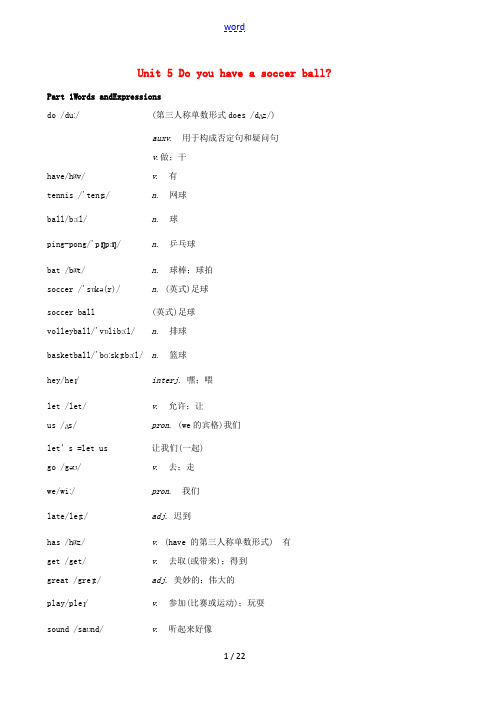
Unit 5 Do you have a soccer ball? Part 1Words andExpressionsdo /duː/ (第三人称单数形式does /dʌz/)auxv. 用于构成否定句和疑问句v.做;干have/hæv/ v. 有tennis /'tenɪs/ n. 网球ball/bɔːl/ n. 球ping-pong/'pɪŋpɔŋ/ n. 乒乓球bat /bæt/ n. 球棒;球拍soccer /'sɒkə(r)/ n. (英式)足球soccer ball (英式)足球volleyball/'vɒlibɔːl/ n. 排球basketball/'bɑːskɪtbɔːl/ n. 篮球hey/heɪ/ interj. 嘿;喂let /let/ v. 允许;让us /ʌs/ pron. (we的宾格)我们let’s =let us 让我们(一起)go /gəʊ/ v. 去;走we/wiː/ pron. 我们late/leɪt/ adj. 迟到has /hæz/ v. (have 的第三人称单数形式) 有get /get/ v. 去取(或带来);得到great /greɪt/ adj. 美妙的;伟大的play/pleɪ/ v. 参加(比赛或运动);玩耍sound /saʊnd/ v. 听起来好像interesting/'ɪntrəstɪŋ/ adj. 有趣的boring/'bɔːrɪŋ/ adj. 没趣的;令人厌倦的fun /fʌn/ adj. 有趣的;使人快乐的n. 乐趣;快乐difficult/'dɪfɪkəlt/ adj. 困难的relaxing/rɪ'læksɪŋ/ adj. 轻松的;令人放松的watch /wɒtʃ/ v. 注视;观看TV/,tiː'viː/ n. (=television /'telɪvɪʒn/)电视;电视机watchTV 看电视same /seɪm/ adj. 相同的love /lʌv/ v.&n. 爱;喜爱with /wɪð/ prep. 和……在一起;带有;使用sport /spɔː(r)t/ n. 体育运动them /ðəm/ pron. (they的宾格) 他(她、它)们only/'əʊnli/ adv. 只;仅like/laɪk/ v. 喜欢;喜爱easy/'iːzi/ adj. 容易的;不费力的after /'ɑːftə(r)/ prep.&conj. 在……之后class /klɑːs/ n. 班级;课classmate/'klɑːsmeɪt/ n. 同班同学Bill /bɪl/ 比尔(男名)Part 2:Texts课文(一)Cindy: Hey, Helen, let’sgo!We’relate!Helen: OK.Cindy: Doyou havethe baseball?Helen: Yes,Ido.It’s in mybag.Cindy: And where’s our baseballbat?Helen: Billhas it.Cindy: Oh,yeah.And doyou haveyour jacket? Helen:Oh, no,Idon’t.It’s on the chair.Let megetit. Cindy: Andyour hat, too!Helen: OK,Ihavemyjacket and hat.Let’sgo!Structure1. Doyou haveabaseball?Yes,Ido./No,Idon’t.Ihaveavolleyball.2. Doyou haveaping-pongbat?Yes,Ido./No,Idon’t. Ihaveaping-pongball.3. Does she haveatennisball?Yes, she does./No, shedoesn’t. Shehas a baseball. 4. Does he haveasoccerball?Yes, hedoes./No. hedoesn’t. Hehas two ping-pongbats.5. Do theyhaveabasketball?Yes, theydo./No, theydon’t.Theyhaveavolleyball.don’t = do not doesn’t = does not句型:—Do/Does sb. have…?—Yes, sb. do /does.—No, sb. don’t /doesn’t.Write eachword inthe correct placeinthe chart.将方框中的单词填入表格中正确的位置。
七年级上册英语《Unit 5 do you have a soccer ball》同步卷和答案详解

人教新版七年级上册《Unit5Do you have a soccer ball?》同步练习卷(2)一、翻译:1.你有足球吗?Do you have?2.让我们不要迟到。
Let's.3.放学后,我喜欢和同学一起打篮球。
I like after school.4.我擅长踢足球。
I'm good.5.我爸爸只在电视上看篮球比赛。
My father only TV.6.我的爷爷对这部有趣且令人放松的电影很感兴趣。
My grandfather is interested in movie.7.莱奥梅西四岁时开始踢足球因为他踢球很开心。
Leo Messi started playing football at the age of four because he had much fun. 8.莉莉总是上学迟到。
Lily school.9.只有这两个男孩住在同一个城市。
live in the same city.10.他不喜欢吃水果但我喜欢。
He doesn't like eating apples but.二.补全对话11.A:Hello,long time no see.(1)?B:I'm fine,thanks.(2)?A:I'm OK.(3)?B:Yes,I like to play baseball very much.A:Me,too.I want to play baseball with my friends tomorrow.(4)?B:Yes.When and where shall we meet?A:Let's meet at8:00at the school gate.B:See you there.A:(5).三.短文填空12.Bob likes(1)(play)soccer after class.And he always plays it alone(独自地).TodayMiss White(2)(see)Bob(3)(play)in the playground. "Hi,Bob.What sport do you like?"Miss White(4)(ask)."Soccer,of course.I have3soccer(5)(ball).One is here,the other is at(6)(I)home,"Bob answers."I see.Why do you play it alone?You can play it with your classmates.""But it's my ball.I don't want(7)(play)it with others.""Is it(8)(interest)to play alone?"Miss White asks."No,it isn't.And it's a little boring,"Bob looks at his ball and(9)(say)."Share(分享)your ball with your classmates.I'm sure you will have fun.Then Bob(10)(do)as(按照)Miss White says.And he really has a great time.He finds that sharing is fun.四.选择填空:13.I have____basketball.Let's play_____basketball.()A.an;/B.a;the C.the;a D.a;/14.Ted has eight ping﹣pong balls,______he doesn't play ping﹣pong.()A.and B.but C.so D.only15.Let's____for a walk,shall we?()A.to go B.going C.go D.gone16.I____a volleyball and he____a tennis ball.()A.have;have B.have;has C.has;have D.has;has 17.We play soccer_____our friends after school.()A.at B.with C.in D.after 18.The girl______every Sunday.()A.play sport B.plays sportC.play sports D.plays sports19.一______is my computer game?一I think it's on the table.()A.What B.How C.Who D.Where20.______are good friends.()A.I and Bob B.Bob with I C.Bob and I D.I with Bob 21.My brother and my cousin_________school.()A.go the same B.go to the sameC.go to same D.go same22.﹣Let's play tennis.﹣________.()A.Thank you B.Yes,pleaseC.That sounds good D.You're welcome五..完形填空23.Hi,I'm Bob.I have(1)good friends.They're Gina,Tom and Jack.Gina is a nice girl.She likes reading.You can see(2)everywhere in her room.Tom likes (3).He has two baseballs,five(4)and three basketballs.He(5)sports with his classmates every day.He thinks it's(6).Jack likes sports,too.(7)he doesn't play sports.He only(8)them on TV.I don't like sports.I think it's boring.I (9)a computer.I like playing games on it.But my mother doesn't(10)me do that on school days.I can only play computer games on weekends(周末).(1)A.two B.three C.four D.five(2)A.books B.keys C.jackets D.pictures(3)A.purple B.numbers C.English D.sports(4)A.rulers B.oranges C.volleyballs puters(5)A.plays B.asks C.knows D.calls(6)A.boring B.difficult C.interesting D.tidy(7)A.And B.But C.Too D.Only(8)A.sees B.meets C.says D.watches(9)A.find B.like C.have D.play(10)A.ask B.let C.call D.say一.翻译24.他妹妹在同一个学校但是在不同的班级。
- 1、下载文档前请自行甄别文档内容的完整性,平台不提供额外的编辑、内容补充、找答案等附加服务。
- 2、"仅部分预览"的文档,不可在线预览部分如存在完整性等问题,可反馈申请退款(可完整预览的文档不适用该条件!)。
- 3、如文档侵犯您的权益,请联系客服反馈,我们会尽快为您处理(人工客服工作时间:9:00-18:30)。
听内容。听时注意整体把握,
注意听名词。
达标练习(我收获,我成功)
总结语言现象,获得语言规律,
及时再现总结。
使用各种人称在对话中进行表达、
体验和应用。首先进行集体任务,再
推进到小组活动。
四、教学评价设计
1.评价方式与工具
□课堂提问□书面练习□制作作品□测验□其它
2.评价量表内容(测试题、作业描述、ave a ball game? ( )
2.Do they have a computer? ( )
3.Does Jane have a ping-pong ball? ( )
4.Does your brother Alan have a bat? ( )
A. No, they don’t. B. Yes, she does. C. Yes, he does. D. No, we don’t.
1.I ________(有) a computer game.
2.Do you have a ____________(排球)?
3.We have two t__________ balls.
4.Do they have a s__________ ball?
5.Yao Ming is a good b_____________ player.
2.学情分析
能够听懂询问是否有某物的句子,并能用do和does引导的一般疑问句询问某人是否拥某物。
3.教学目标(含重难点)
熟练掌握以下句型:
—Doyouhavea ping-pong bat? —Yes, Ido. /No, Idon’t.
—Dotheyhavea volleyball? —Yes, theydo. /No, theydon’t.
教学设计模板
课题摘要
学科
英语
学段
初中
年级
初一
单元
第五
教材版本
人教版
课程名称
一、学习内容分析
1.教材分析
通过本节课的学习,能够:
1)熟练掌握词汇:do, have, ball, tennis, soccer, volleyball, basketball, let, us, go, we, late, has, get的音,形,义;正确读出并了解soccer ball, bat, ping-pong, hey。
三、教学过程设计
教学环节
活动设计
信息技术使用说明
一、课前准备(我自学我先懂)
小组内所写内容
互相交流一下。
你学过的很多单词都可以用哟!
互相交流一下你们拥有的物品
吧!
课堂展示与释疑(我展示,我提高)
1.体会新语言项目
2.检测课前自学任务,体验新
词汇及其重点句型,为听力
训练做好准备。
进入情境,体会新句型。
—Doeshehavea tennis? —Yes, hedoes. /No, hedoesn’t.
—Doesshehavea soccer? —Yes,shedoes. /No, shedoesn’t.
了解和体育运动有关的英语知识,并培养对运动的热爱。
二、教学环境选择
□简易多媒体教室□交互式电子白板□网络教室□移动学习环境
六、备注
少壮不努力,老大徒伤悲
备注:本模板仅供参考,参训教师可根据实际情况,自行修改创新。
